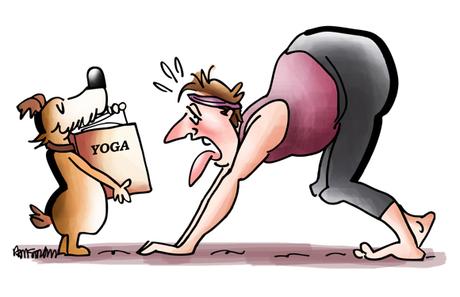
First of all, if you’re doing yoga, and you’re trying to master the Downward-Facing Dog Position, it pays to partner with an expert…


I drew the above for an article called “William James, Yoga, and
the Secret Of Happiness,” which appeared in the 03-01-20 edition of The Wall Street Journal.
Does this sound familiar: you’re going through a hard time. Life’s beating you up. So you withdraw. You retreat to some dark place where you’re safe, and away from it all.

And how does it make you feel? Lousy, depressed.

William James (1842-1910) wouldn’t find that surprising. James
is considered the Father of American Psychology. He believed our actions (or non-actions) largely dictate our emotional state. He wrote:

Panic is increased by flight… sobbing makes sorrow more acute… in rage, we work ourselves up…
Sit all day in a moping posture, sigh, and reply to everything with a dismal voice, and your melancholy lingers…
And consider this arresting sentence:

We don’t laugh because we’re happy, we’re happy because
we laugh.
In other words: Do something. Get moving. Inactivity is the enemy.

John Kaag, the author of the WSJ article, had been going through a rough time. He decided to take James’ advice– and took up yoga.

He experienced absolute agony at first, especially trying to do the downward-facing dog. But he persisted, and became a believer. He now sees yoga as “a type of emotional and physical spring training for the rest of my life.”

Which jibes nicely with something else James wrote: “Everybody should do at least two things each day that he hates to do, just for practice.”

We all get tempted to withdraw. To become inactive: physically, mentally, emotionally. It’s the road to misery and self-sabotage.

A better path, quoting Mr Kaag: “We can actively form habits that teach us to risk ourselves, to fall, and then to use our dorsal muscles to stand up straight once again.”

Does action guarantee success and happiness? No, it doesn’t. William James knew this, and he summed up the situation with
this great one-liner:

Actions do not always bring happiness, but there is no happiness without action.”



1. It pays to invest in humor. For yourself, for your brand. Laughter creates happiness, and people like those who make them happy.

2. Happiness requires action. Action is always risky. You have to take risks if you want to succeed and be happy.
3. There are no guarantees your actions will bear fruit. You have to act anyway.

